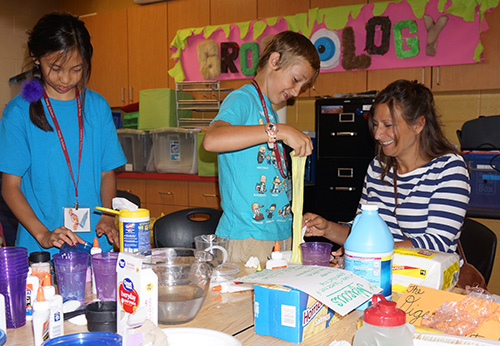
FAYETTEVILLE, Ark. -- Fifth-grader Kolt Burton and his mother giggled as they stretched the pale green goo they had just created out of glue, water, food coloring and liquid starch between their hands.
"What's that supposed to be?" a friend asked.
"Colored mucous - the best kind!" Kolt replied. He was one of 32 children participating in the University of Arkansas Young Scholars summer program at Butterfield Trail Elementary School in Fayetteville from June 20 to July 1.
The second- to fifth-grade pupils demonstrated their newfound knowledge to family members at an open house on July 1.
The two-week camp is a project of the gifted and talented education program in the College of Education and Health Professions. Graduate students design and teach the courses, giving children the opportunity to explore advanced-level content, extend their thinking skills and participate in hands-on learning activities.
Children this year chose two topics from among five focus areas - photography, petrology, astronomy, ethnography and "grossology," or the study of biology and the bodily systems that keep people well. Children in that class made "mucous" to learn about the immune system, squeezed "poop" through stockings to study the workings of the digestive tract and visited the Fayetteville wastewater treatment plant, among other activities.
"The grossology is a wonderful experience," said Kolt's mother, Tonya Landrum. "It's absolutely gross enough for the kids, and they are learning many different aspects of biology."
Her son was even more taken with his other class, a study of Islamic culture with Saudi Arabian graduate student Riyadh Hakimi, Landrum said. Students learned about Arabic language, history, customs and dress and made a visit to the King Fahd Center for Middle East Studies at the university and the Islamic Center of Northwest Arkansas.
"It was a life-changing experience for him," Landrum said about the course. "He came home one day and said, 'The language is so beautiful …' He developed a lifelong appreciation for that world."
The experiential learning that is a hallmark of gifted and talented education is effective with all kinds of students, said Marcia Imbeau, professor of special education in the College of Education and Health Professions and director of the Young Scholars program. "When they get to do things they love, it's amazing how their learning goes up."
Students have asked her if she knows the rule of thirds in photography and how igneous rocks are formed, Imbeau said. "They know the vocabulary and they know the concepts behind it."
The summer program allows graduate students seeking certification as gifted and talented teachers to test strategies they have learned in Imbeau's curriculum development class. Meredith Reeves, a teacher who will help open the new Linda Childers Knapp Elementary School in Springdale this fall, said she will take the principles she's learned into her third-grade classroom.
"As much real-world experience as these kids can get - that is where the real learning takes place," she said. "It helps them realize why learning matters. … It's so crucial for kids to have that understanding - not just knowledge, but understanding."
Students in Reeves' petrology class learned about rocks by researching the topic, hearing from experts, taking a field trip to War Eagle Cavern and making their own igneous, metamorphic and sedimentary "rocks" from candy.
"It's a fantastic program," said Jill Rohrbach, whose fifth-grade son, James, signed up for the rock science and astronomy classes. "It keeps him thinking and learning through the summer months."
Michael Daugherty, head of the Department of Curriculum and Instruction in the College of Education and Health Professions and professor of STEM education, told parents at the open house that he asks his STEM students each fall what they remember from their earlier education.
"Never once do they mention worksheets and multiple choice tests," he quipped. "They remember the projects, working together, taking a concept and building on it. Learning is about getting kids to be hands-on, helping them be creative, innovative and inventive. That starts at this level."
Contacts
Bettina Lehovec, staff writer
University Relations
479-575-7422, lehovec@uark.edu
Heidi Wells, director of communications
College of Education and Health Professions
479-575-3138, heidisw@uark.edu